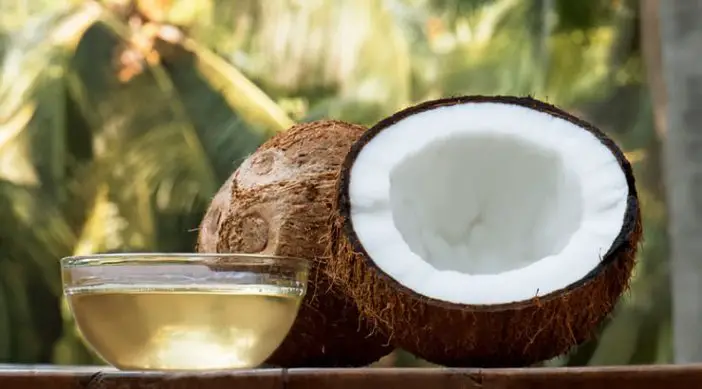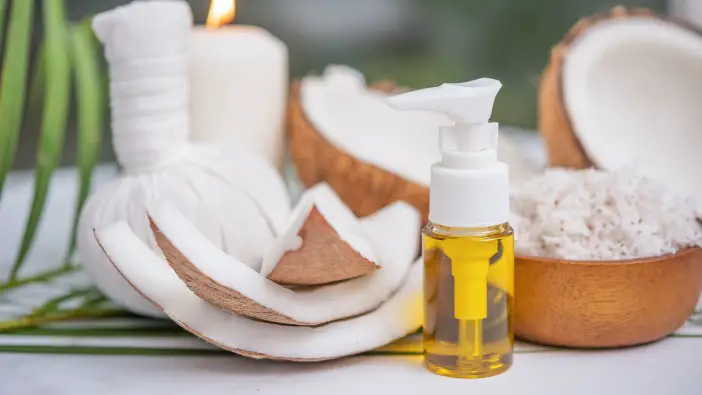Ever wondered if coconut oil is as good as they say or just a myth? Then this is for you.
“Coconut oil is a natural, affordable, and readily available cosmetic ingredient that is great for use on the skin”, says, Dr. Joshua Zeichner, a board-certified dermatologist.
Studies have shown it to have many health benefits including improved skin complexion, reduced inflammation, and reduced signs of aging.
In addition, coconut oil has antioxidant properties, which help to reduce the appearance of wrinkles and fine lines on the skin by boosting the production of collagen.
This article discusses everything you need to know about coconut oil for skin: how it works, its benefits, and some great recipes for nourishing your skin.
What is Coconut Oil?

Coconut oil is a plant-based fat that is rich in medium-chain fatty acids. It is extracted from the meat of matured coconuts by pressing or centrifuge processes.
Coconut oil is fat of a liquid form at room temperature. It is not a single chemical but a mixture of different compounds. The most important of these are lauric acid, capric acid, and myristic acid explains Dr. Zeichner.
These three chemicals make up about 70% of the composition of coconut oil. Other components include saturated fats like stearic acid and palmitic acid, as well as monounsaturated fats like oleic acid.
Is Coconut Oil a Good Moisturizer?

Coconut oil is full of fatty acids that moisturize the skin and leave it feeling nourished. These fatty acids also help support skin elasticity and fight against free radicals that can lead to premature aging.
Coconut oil is not only rich in fatty acids that are critical for healthy skin, but it also has antibacterial and anti-inflammatory properties which help to soothe the skin and relieve skin conditions.
It’s also 100% natural and doesn’t contain any chemicals or fragrances like many other moisturizing products.
Is Coconut Oil Good for Dry Skin?
If you suffer from dry skin, coconut oil is one of the best natural remedies out there for you. This is because it is made up of fatty acids that are great for moisturizing and helping your skin stay hydrated.
It also contains antibacterial properties that help kill acne-causing bacteria and prevent breakouts on your face. Coconut oil is also one of the few oils that isn’t easily broken down by bacteria and soap, which means it doesn’t break down and leave your skin feeling greasy.
Instead, it leaves your skin feeling soft, and smooth with a subtle hint of coconut scent.
Is Coconut Oil Good for Oily Skin?
Coconut oil can be beneficial to an individual who has oily skin because it has antibacterial properties that can help fight against acne-causing bacteria and prevent future breakouts.
“However, coconut oil is also comedogenic which means it’s likely to clog pores and lead to breakouts”, Dr. Zeichner explains further.
Not everyone will get congestion with coconut oil, so the best thing to do if you have oily skin is to do a patch test to determine if coconut oil is good for you or not.
SEE: Discover Simple Ways to Stop Your Oily Skin And Make It Less Slippery
Is Coconut Oil a Good Sunscreen?
Coconut oil when applied by itself can only protect your skin against UVB rays (the ones that cause sunburns). It doesn’t protect against UVA rays (the ones that can lead to premature aging and cancer).
“Coconut oil does have some SPF qualities, but not enough to fully protect your skin from sunburn or other damage” Dr. Zeichner explains. So before you trade in your sunscreen for coconut oil, keep in mind that coconut oil just isn’t enough.
Coconut Oil for Skin Whitening
Coconut oil has many benefits for skin whitening. It can help lighten dark spots, scars, and under-eye circles because it contains vitamin E. It also has anti-inflammatory properties, making it perfect for whitening the skin.
In addition, the oils in coconut oil can help heal damaged cells on your skin thereby improving your complexion. Its antioxidant properties will also help protect your skin from UV rays and environmental pollutants to keep it healthy and supple.
SEE: Is Shea Butter Comedogenic? Here’s What You Should Know
Coconut Oil Benefits for Skin

It’s antibacterial
In addition to its many benefits for overall health, studies have shown coconut oil to have antimicrobial properties that can kill bacteria and fungi on the skin.
For instance, it contains lauric acid which is an ingredient that acts as an antibacterial agent to cleanse your skin and keep it free of bacteria that cause acne.
Hydrates skin
Coconut oil is a popular ingredient in skincare products due to its ability to penetrate deep into the skin and lock in moisture. This is because it contains lauric acid which is known for its ability to retain water and seal in moisture.
Reduces inflammation
The fatty acids found in coconut oil act as an anti-inflammatory agent. They do this by blocking enzymes that produce prostaglandins, which is another type of chemical released by the immune system in response to infection or damage.
Promotes wound healing
The antibacterial properties in coconut oil provide an alternative to traditional treatments for wounds and cuts, which can lead to more rapid healing times.
When applied to a wound, coconut oil can help to speed up the healing process, making it much faster. It also reduces the risk of infections and the formation of scars on the skin.
Exfoliates skin
The medium-chain fatty acids and glycerin in coconut oil help to remove dead skin cells from the skin’s surface layer. These two ingredients can also help to moisturize your skin without leaving any oily residue behind which is why it is such an excellent ingredient in body scrubs.
Soothes sensitive skin
Coconut oil’s antibacterial properties, its anti-inflammatory effects, and its ability to keep the skin moist can be helpful in soothing sensitive skin. It also contains a healthy fat called lauric acid, which is an effective skin moisturizer and healing agent.
Relieves eczema
Coconut oil is rich in antioxidants and anti-inflammatory properties which may help improve circulation and reduce the severity of eczema symptoms.
Moreover, its antiviral and antibacterial properties make it very good at fighting off the bacteria that cause skin conditions such as eczema.
Prevents wrinkles
The fatty acids in coconut oil are natural antioxidants that help maintain healthy collagen levels in the skin. Collagen helps to prevent sagging skin and reduce the appearance of fine lines and wrinkles on the skin by keeping the skin plump and elastic.
Sunscreen
Coconut oil is a natural sunscreen. Although it doesn’t replace your regular sunscreen, it has an SPF of about 4-6, which means that it can give your skin extra protection from the sun.
It also helps to balance the natural pH levels in your skin, promoting the healing of sun-damaged cells.
SEE: Bursting the Myth – Is Sunscreen Good For Dark Skin Tones?
How to Use Coconut Oil on Your Skin

Body moisturizer
People have used coconut oil for centuries to moisturize skin. It’s a popular ingredient in skincare due to its ability to provide long-lasting hydration and protect against dryness.
Here, are some ways to use coconut oil to moisturize your skin:
- Apply a thin layer of coconut oil to irritated areas on your skin.
- Mix the oil with your favorite moisturizer and apply it to your skin.
- Rub some coconut oil on dry or tired feet before bed.
- Soothe your sunburns by applying coconut oil directly onto the burn, then cover with bandages.
Homemade body scrub
Coconut oil is also an excellent way to remove dead cells from the skin surface, revealing the younger-looking skin underneath. By incorporating coconut oil into your body scrub recipe, you can get smoother, softer skin in no time.
Here’s how to do it:
- Measure out 1 cup of brown sugar and 1/2 cup of coconut oil in a bowl.
- Add 1/4 cup of lemon juice and mix until they form a paste-like substance.
- Add more sugar or coconut oil as needed to get the desired consistency.
- Stir together until they are well combined.
Face cleanser
Oil dissolves oil. That’s right, coconut oil is a healthy, natural, and effective way to clean and nourish your face. It dissolves the oils and make-up residue on your skin making it easier to wash them off with your regular cleanser.
Here’s how to do it:
- Get a jar of coconut oil and scoop some out with your fingers.
- Rub the oil onto your face in circular motions, thoroughly covering all areas of your skin.
- Relax for about 5-10 minutes before washing it off with warm water and patting dry with a clean towel or cloth.
Lip balm
Coconut oil lip balm is a great way to soothe dry lips. It contains all-natural ingredients, it’s quick and easy to make, and it’s budget-friendly. More so, a coconut oil lip balm will help your lips stay soft and hydrated all day long.
Here’s how to do it:
- Fill your pot with coconut oil.
- Put the pot on the stove at low heat.
- Add sugar, beeswax, and some essential oils (if desired).
- Stir together and wait for the mixture to melt.
- Pour the mixture into a lip balm container and let cool.
Face massage
Coconut oil is a great nutty-flavored oil that can also be used to massage the face. Personally, it is my go-to for a stimulating face massage and that’s because it helps to moisturize the skin. It also helps to improve blood circulation and relax facial muscles naturally.
Here’s how to do a face massage with coconut oil:
- Clean your face with a gentle cleanser to get rid of all oils and impurities.
- Wash your hands properly and pat dry with a clean towel.
- Pour a generous amount of coconut oil on your palms and rub them together.
- Massage the oil into your face in upward, circular motions.
- Starting from your forehead, massage thoroughly down to your jawline.
- Place your palms on your face, press gently while taking long deep breaths (this will help you relax).
- Wash off with warm water and apply a moisturizer.
SEE: How to Do Facial at Home: 7 DIY Steps to Achieve a Glowing Face
FAQs

Can coconut oil make my skin glow?
Yes, it can. Coconut oil is rich in fatty acids like lauric and capric acid that can penetrate deep into the skin and help remove dirt and sebum that may clog pores.
These fatty acids also help improve collagen production in your skin, reducing signs of aging such as wrinkles and fine lines on the face.
Does coconut oil moisturize skin?
Yes, it does. Coconut oil is an all-natural moisturizer that’s great for providing deep hydration for the skin.
And unlike many other moisturizers, coconut oil doesn’t contain any chemicals or additives that can irritate your skin. It also has anti-aging benefits that help to promote healthy, glowing skin.
Can I use coconut oil to treat eczema?
Yes, you can. Coconut oil has antimicrobial properties which make it very good at fighting off bacteria, and skin conditions like eczema.
It is also rich in healthy fats which help balance the natural pH levels in your skin and promote the healing of damaged skin cells.
Conclusion
Coconut oil is an extremely beneficial product for the skin. It is an all-natural product that is rich in anti-inflammatory properties that help promote collagen production, regenerate skin cells, and maintain elasticity.
It also possesses antioxidant and antimicrobial properties that help protect your skin from sun damage, fight against skin conditions like eczema, and reduce the appearance of wrinkles on your skin.
However, its effects can vary from person to person so before you slather a bottle of coconut oil on your body, make sure to do a patch test to see if it works for you.
Thanks for reading.
Africana Fashion provides you with daily skincare articles to help you achieve healthy, glowing skin.







